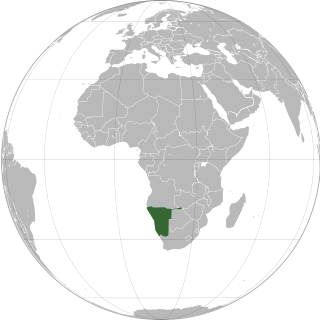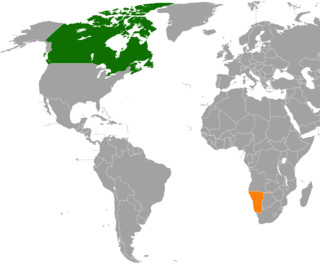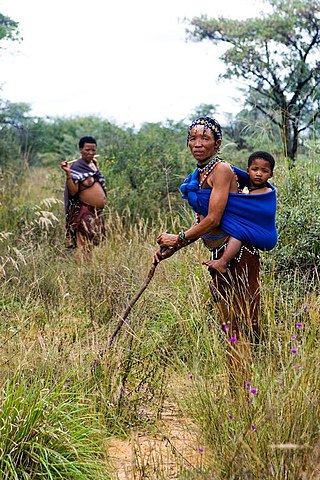| |||||
| Decades: | |||||
|---|---|---|---|---|---|
| See also: | |||||
Events in the year 2000 in Namibia .
| |||||
| Decades: | |||||
|---|---|---|---|---|---|
| See also: | |||||
Events in the year 2000 in Namibia .
Telecommunications in Namibia include radio, television, fixed and mobile telephones, and the Internet.

The Cunene or Kunene is a river in Southern Africa. It flows from the Angola highlands southwards to the border with Namibia. It then flows in a westerly direction along the border until it reaches the Atlantic Ocean.

The Ovambo language is a dialect cluster spoken by the Ovambo people in southern Angola and northern Namibia, of which the written standards are Kwanyama and Ndonga.

Lesbian, gay, bisexual, and transgender (LGBT) rights in Namibia have expanded in the 21st century, although LGBT people still have limited legal protections. Namibia's colonial-era laws criminalising male homosexuality were historically unenforced, and were overturned by the country's High Court in 2024.

Namibia – United States relations are bilateral relations between Namibia and the United States. Relations were officially established in 1990 upon Namibia gaining independence from apartheid South Africa.
The Special Field Force (SFF) is a Namibian Police Force paramilitary police unit created in 1995 by the late commissioner Ruben "Danger" Ashipala as an auxiliary aggressive unit to complement the Special Reserve Force (SRF). It encompasses border guards, VIP Protection Unit and Installation unit. Approximately half of the Namibian Police's (NAMPOL) overall complement is assigned to the SFF which is made up primarily of combatants from the former People's Liberation Army of Namibia (PLAN) and South West African Territorial Force (SWATF).

The Supreme Court of Namibia is the highest court in the judicial system of Namibia. It is the court of last resort and the highest appellate court in the country. It is located in the city centre of Namibia's capital city, Windhoek. A Supreme Court decision is supreme in that it can only be reversed by an Act of Parliament that contradicts it, or by another ruling of the Supreme Court itself.

The Constitution of Namibia is the supreme law of the Republic of Namibia. Adopted on 9 February 1990, a month prior to Namibia's independence from apartheid South Africa, it was written by an elected constituent assembly.

Bilateral relations between Canada and Namibia began in 1977. Both countries are members of the Commonwealth of Nations. Neither country has a resident ambassador.

NamRights, formerly National Society for Human Rights (NSHR), is a Namibian non-profit human rights organization, led by Phil ya Nangoloh who founded the institution in 1989.

The Zembapeople are a Bantu ethnic group residing in the border regions of Namibia and Angola. In Namibia, they are predominantly found in the Kunene region, most notably in the Opuwa area. They speak the Zemba language, also known as OtjiZemba or Dhimba. The Zemba are well-known for their distinctive hairstyles, intricate iron and copper jewelry, as well as traditional clothing that often incorporates animal hides. Additionally, they decorate themselves with a blend of ash, ochre paste, and rancid butter to enhance their appearance.

Namibian Sign Language is a sign language of Namibia and Angola. It is presumed that there are other sign languages in these countries.
Elizabeth Khaxas is a Namibian writer and activist.
Johannes Nicolaas Horn is a Namibian Professor of Human rights and Constitutional Law at the University of Namibia (UNAM) since 2002. He holds PhDs in Theology and Law, and was an advocate in the Office of the Prosecutor-General, and Prosecutor in the High Court of Namibia. He worked as UNAM's Director of the Human Rights and Documentation Centre, Dean of the Law Faculty from 2008 until 2010 and also served on the UNAM Governing Council. Nico Horn is the founding editor and a founding trustee of the Namibia Law Journal and chairperson of the Board of Trustees of the SADC Law Journal. He was also a Pastor for the Pentecostal church in South Africa.
TheLegal Assistance Centre is a human rights organization in Windhoek, the capital of Namibia. The organization was established in 1988 during the apartheid era to litigate on behalf of people who were oppressed by the government and continues to operate today.

Women in Namibia face challenges in their health, gender based violence, and access to education. The government of Namibia is taking steps to provide women with equal rights to a degree that is largely unparalleled in Sub-Saharan Africa, including the promise of gender equality and increased parliament representation in the Namibian constitution. Women currently serve in nearly half of all seats in parliament and the first female Prime Minister was elected in 2015.

Human rights in Namibia are currently recognised and protected by the Namibian constitution formed in 1990 by a 72-seat assembly. The assembly consisted of differing political parties. After a draft, the constitution was agreed upon by all members of the seven political parties involved. 21 March 1990 marks the first day Namibia operated under the Constitution and also marks the recognition of Namibia as an independent nation. Chapter 3 of the constitution entitled Fundamental Human Rights and Freedoms, also referred to as the Bill of Rights, outlines the human rights of all Namibian citizens.
According to the Namibia Statistics Agency based on the 2016 Inter-censal Demographic Survey, 5% of Namibia's population has varying degrees of disability.

Margaret Sekaggya is a Ugandan lawyer and human rights activist. From 2008 to 2014, Sekaggya was the United Nations special rapporteur for human rights defenders.
Capital punishment was abolished in Namibia in 1990. The last execution was carried out in 1988, under the rule of South Africa.